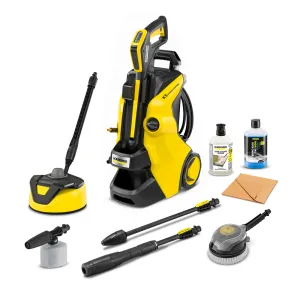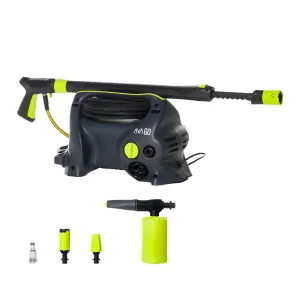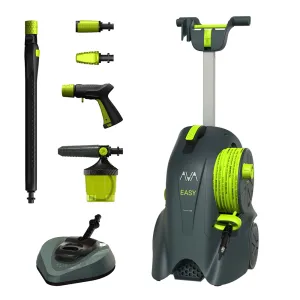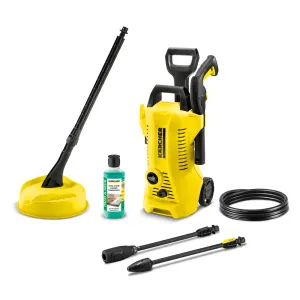First up, is it algae that you’ll be removing when you pressure wash a hard surface? The short answer is yes. That green tinge on your patio comes from algae build up together with general dirt and grime.
Algae can cover a stone or wood surface quickly, thriving in damp conditions and in shaded areas too – dulling down surfaces and creating a potentially dangerous slippery surface.
The good news is that pressure washers will easily remove algae, mould, dirt and grime leaving you with a sparkling clean, brighter, safer surface.
Should I buy a pressure washer, power washer, or jet washer?
At Agrigem, we sell pressure washers rather than power washers (power washers require hot water to work). With a pressure washer, the only thing you need to worry about is attaching the machine to your water source, plugging in and pulling the trigger.
But is it a pressure washer you need for your project?
Pressure washers are great for general outdoor cleaning projects – patios, decks, walls, fences, and outdoor furniture. When used correctly, a pressure washer won’t damage surfaces.
If you can see yourself wanting to clean your outdoor hard surfaces a few times a year and you don’t have stubborn or difficult substances like oil to remove, then you need a pressure washer.
Power washing uses hot water so may be appropriate if you are tackling oil and grease or areas with significantly heavy grime build-up. However, power washers tend to be more expensive and can be harder to operate.
Jet washing, also known as UHP (ultra-high pressure) washing, is the term usually applied to cleaning at exceptionally high pressures.
Jet washing is a professional process and requires trained operators to use the machine effectively. This is because jet washing is normally deployed to remove paint and scale to expose the original substrate. You should not use a jet or UHP washer to tackle patio or deck-cleaning projects.
Is pressure washing a messy process?
It can be. But the more efficient you are with the lance, the less mess you will make, and the lighter the algae or grime covering, the lighter the mess!
Be prepared and wear waterproof gloves, shoes and trousers if you’re pressure washing in cold weather. Even the most experienced pressure washers will inevitably throw up grimy water and grit - and water hitting a stone, wonky patio slab or awkward corner can send the spray in unexpected directions.
Be on the safe side and equip yourself with goggles or a face shield to avoid grit and spray getting into your eyes.
You can alter the nozzle and spray pattern to suit your cleaning project, using a narrower spray for more concentrated cleaning and a wider fan for general cleaning.
Look for a pressure washer that allows you to alter the pressure – giving you the flexibility to tackle more delicate surfaces on a lower setting.
Work methodically in consistent sweeping patterns to keep water use to a minimum and prevent splashing.
Finally, make sure you are directing the dirty water towards a drain or location that can absorb it. You don’t want to create a pool of grimy water that you need to deal with later.
Practice makes perfect and with a little time, you’ll soon find your feet and be pressure washing effectively!
Can you use other cleaning products with a pressure washer?
Pressure washers will remove general algae, dirt and grime without the need for additional detergents. However, most pressure washers will come with a detergent that is appropriate to use with that machine – should you wish.
Don’t use other non-compatible products with your pressure washer as this could damage it and may not be safe for the environment.
If you have particularly stubborn algae, consider using an algae killer like Nvirol a few weeks before pressure washing. Alternatively, you can try a product like Sapphire after power washing to prevent further algae growth.
What’s the best time of year to undertake pressure washing?
Pressure washing can be carried out at any time of year, whenever you need to remove grime and algae from outdoor hard surfaces.
However, like most garden maintenance jobs, the key times are spring and autumn. A spring pressure wash will tackle algae that has built up over winter. An autumn pressure wash will help reduce the risk of slippery surfaces as dirt and algae builds up with the arrival of wetter weather.
Whenever you decide to tackle your outdoor cleaning project, always try and complete it before the arrival of frost.
Explore our pressure washer range on this page, or get in touch if you have any questions.







